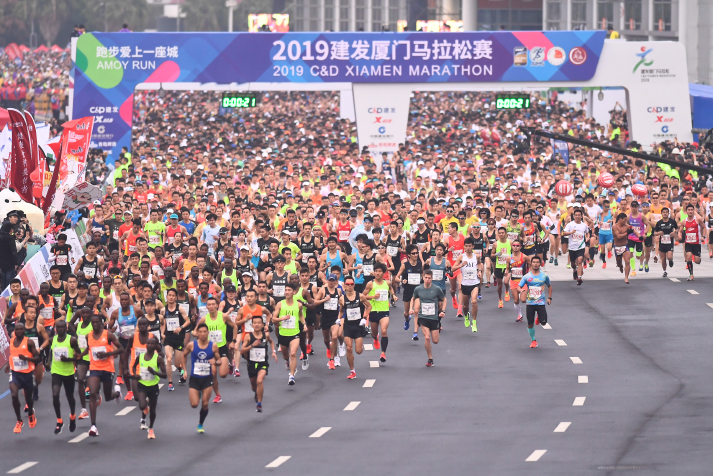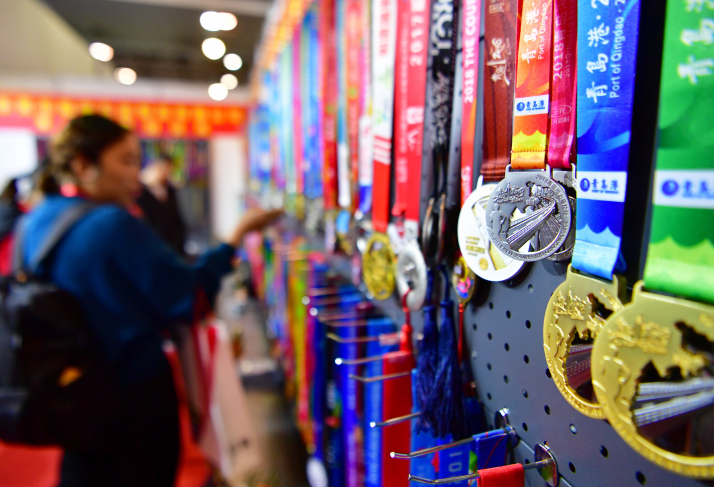| Lifestyle |
| Running on All Cylinders | |
| Xiamen Marathon creates a track record | |
|
|
 The Xiamen Marathon in southeast China's Fujian Province draws 28,208 participants on January 6 (COURTESY PHOTO)
Ye Wei has been off to a running start in 2019, literally. The 35-year-old, who works at a state-owned enterprise (SOE), came 12th among Chinese runners at the 2019 Xiamen Marathon on January 6, clocking his personal best of 2:29. It showed how much his physical fitness has improved. The first time he took part in 2003, he couldn't even finish the run. "I reached the end by taking the aid car," Ye said. But 16 years of persistence has made him the best marathoner in Xiamen, the coastal city in southeast China's Fujian Province. Ye attributed his improved performance to persistent training and a newly introduced system in the marathon, the "wave start." It is a staggered start in which the top-seeded runners get off first, with the rest following in two waves. "The wave start allowed me to run with people who are really good at pacing," Ye told Beijing Review. The Xiamen Marathon became the first Chinese marathon to adopt the system last year. Bigger and better It is among the marathon's many firsts, including the first to be part of the UN Environment's Clean Seas campaign to clear the oceans of plastic. Launched in 2003, the Xiamen Marathon, held in every January, is one of China's premier marathons. It has been recognized as a Gold Label Road Race by the IAAF and carries a top prize of $50,000. The aim is to upgrade to a Platinum Label Road Race by 2020, which requires minimum 50 participants from the top 200 runners in the IAAF World Rankings or from the top 100 of Asia. Applicants for the Xiamen marathon reached a record high of 81,000 this year, Wu Mingxian, Deputy Director of the Xiamen Municipal Bureau of Sports, said. They were shortlisted to 28,208, who hit the tracks. "It shows that the Xiamen Marathon is an inviting event for runners," Qi Bing, Chairman of the Xiamen Media Group Sports Co., told Beijing Review. He Yinli, the fastest Chinese female runner in the competition, echoed Qi, saying the marathon is maturing and becoming more professional. "China's marathon organizers are providing more thorough services for runners," she said. About 15 supply stations were set up along the route, providing free water, food, energy bars and salt tablets. Medical teams and ambulances stood by every 1 kilometer. When the event was over, there were post-race services such as foot baths and massages. Michael Nishi, a member of the IAAF assessment team, said the marathon was over and above his expectations. "It has been a very good experience. Everything I saw today was a great event," he said on the day the marathon was held. Benefits for all The marathon was born out of a letter from a sports-loving resident, Ma Da. In 2002, Ma wrote to the local government, suggesting that a marathon be started on the renovated and greened Huandao Road, whose length equals the course of a full marathon. The government heeded the suggestion and the next year, the marathon was started with 11,988 runners. Ye Wei and his father, Ye Han, both SOE employees, were among the first batches of runners. In 2003, Ye Wei took the 10-km race and his father took the full marathon. The next year, Ye Wei tried the full marathon, but failed to finish it but one year later, he accomplished his goal. From then on, the Xiamen Marathon became a tradition for the Ye's, where the father and son duo ran side by side. In 2012, Ye's father got his permanent number for the event--A688—after taking part for the 10th time. Ye followed in his father's steps and got his own number, A689, one year later. Every year, when the event approaches, people, including neighbors and even the community breakfast sellers, start asking him if he is ready for the event. "People in Xiamen now celebrate the Xiamen Marathon like the New Year or Spring Festival," Ye said. In 2007, the Xiamen Marathon was recognized by the IAAF as a Gold Label Road Race and more and more runners and spectators began flocking to the coastal city in spring. "In the first years, few took part in the Xiamen Marathon. Now runners have to work hard to get an entry," Ye said. More than 600,000 runners have taken part in the event and marathon visitors have become a driver of local tourism. According to Qi, in 2018, the marathon resulted in direct economic benefits worth 291 million yuan ($42.6 million). Because of the marathon, road races have become the most popular sport in Xiamen. The Xiamen Marathon engages not only runners but also non-runners, who come to volunteer. This year, there were more than 5,000 volunteers and 80 cheering squads. "More and more citizens are volunteering for the event," Qi said. The marathon has become a local carnival where winners' family and friends can share the limelight as they are invited to put the medals around the victors' necks. All runners enjoy free transportation in Xiamen on the day of the marathon. "We hope that runners can feel the hospitality and warmth of the city," Qi said.  The Third China Marathon Expo kicks off in Xiamen, southeast China's Fujian Province, on January 3 (XINHUA)
The tipping point The recent years have seen a boom in marathons in China. In 2013, there were only 39 running events nationwide, but the number surged to 1,102 in 2017, according to Wang Nan, Vice President of the Chinese Athletics Association (CAA). At the third China Marathon Expo, held three days before the Xiamen Marathon, Wang said 2018 was "the tipping point of China's marathon development, which is switching from high-speed boom to a trajectory of viable and quality development." However, the rapid popularity is also bringing problems in its wake, such as unprofessional management, which has triggered a debate on marathons in China, she said. However, Wang said the debate is neither unexpected, nor a bad thing. "It means that marathons are getting more and more public attention in China," she said. "Being in the spotlight helps us to improve the management of the marathons." In the past two years, the CAA issued several guidelines to improve marathon operations. In 2018, it offered five training workshops for marathon organizers. A Green Message The Xiamen Marathon, as part of the UN Environment's Clean Seas campaign to clear the oceans of plastic, sent out a strong green message. Biodegradable cups and barreled water were offered during the event to cut down on the use of plastic. The Clean Seas campaign, started in February 2017, urges governments to pass plastic reduction policies and industries to minimize plastic packaging and redesign products. It calls on consumers to change their plastic throwaway habits before irreversible damage is done to our seas. Naysan Sahba, Director of UN Environment's Communications division, called the marathon's anti-plastic measure a significant act. He hoped the marathon would also switch to alternative materials for its badges, medals and wrist bands to set a world-class example not only as a marathon but also as a sustainable event. "I think the organizers, the city, and sponsors of the Xiamen Marathon will take even further steps to get all the way down to zero waste," Sahba said, calling on all marathons in China and all sports event around the world to turn the tide on plastic usage. (Reporting from Xiamen) Copyedited by Sudeshna Sarkar Comments to linan@bjreview.com
|
|
||||||||||||||||||||||||||||
|